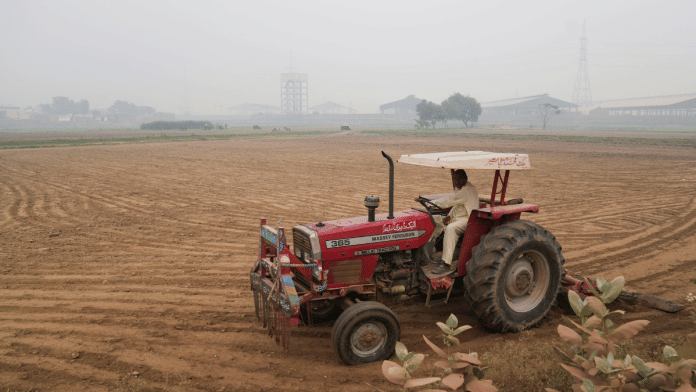New Delhi: Agricultural income taxes in Pakistan’s Punjab province could go up to 45 percent after the provincial government tabled a piece legislation to this effect in the assembly—in line with the requirements of an International Monetary Fund (IMF) bailout. If passed, wealthy landowners could also see a super tax of 10 percent on their agricultural incomes.
The Punjab Agriculture Income Tax (Amendment) Act, 2024, which raises agricultural income taxes in line with corporate and other tax rates, was introduced in the provincial assembly Monday. The draft legislation had earlier been approved by the Punjab provincial cabinet.
As part of its $7 billion bailout deal with cash-strapped Pakistan, the IMF identified a need to increase government revenue by increasing tax on agricultural income, among other initiatives.
The proposed new tax structure removes the schedules related to taxes on irrigated land or agricultural income, bringing all agricultural income under one common federal tax rate. It also introduces super tax rates varying from 1 percent on incomes over Pakistani rupees (PKR) 150 million to 10 percent on incomes exceeding PKR 500 million, according to Pakistan Today.
Additionally, non-compliance will attract daily penalties ranging from PKR 10,000 to 50,000.
Historically, agricultural income tax rates have been determined by provincial governments—Punjab, Sindh, Khyber Pakhtunkhwa, and Balochistan. The rates were “abysmally low and poor in terms of enforcement”, Pakistani economist Javed Hassan told ThePrint.
The Punjab Agricultural Income Tax Act of 1997 established a tiered structure for taxing agricultural income—based on either acres or income, whichever was higher.
Under these slabs, the highest rate was 15 percent on agricultural income above PKR 48 lakh. Agricultural income of less than PKR 12 lakh attracted a tax of just PKR 2,000 a year.
Reuters also reported that, although agricultural income contributes 23 percent to Pakistan’s gross domestic product (GDP) and employs 35 percent of the labour force, it has “historically been taxed much lower than other sectors”.
In July, Nathan Porter, the IMF’s chief of mission for Pakistan, told the media that “taxing agriculture is a core component of the International Monetary Fund’s new programme for Pakistan and is critical to its success. If the commitment is not followed, the programme’s success will be at risk.”
Pakistan has taken over 20 IMF bailouts since 1958 and is currently the IMF’s fifth largest debtor. According to the IMF website, Pakistan owes the multilateral lender $6.68 billion as of 13 November, including a tranche of over $1 billion paid out of the current $7 billion package in September. The package was agreed to in July this year.
Record high inflation numbers and many political crises, including the arrest of former prime minister Imran Khan, pushed the country close to a sovereign debt default in 2023 before the IMF bailed it out.
Also Read: Pakistanis have no sympathy for defence minister heckled in London. They say ‘tit for tat’
Missed deadlines and last-minute scrambles
In an effort to meet the conditions of the bailout, all four provincial governments were meant to align their agricultural tax rates to the federal tax structure by the IMF’s deadline of 30 October, but all of them missed it.
In Punjab, the amendment will be debated in the upcoming sessions. Khyber Pakhtunkhwa is also in the process of discussing agricultural income tax rate hikes. It is expected to pass legislation this month.
According to Hassan, the increase in tax rates may lead to resentment among farmers, who have been used to paying low taxes or no taxes at all.
He said he expects considerable pushback, especially since input costs are going up.
“The prices of electricity, gas etc are all increasing,” Hassan said. “However, there is no option but for the government to go ahead with this.”
Still, the government also faces the issue of tax collection, he said.
“I do not expect the bureaucracy to be ready for tax collection,” he said. “No targets have been set for the first year of tax collection for a reason.”
According to the economist, the IMF programme expects each province to generate a surplus, which will then be clubbed with the surplus at the federal level in order to repay the loan.
“This quarter, Punjab generated a deficit, so they are facing the heat,” he said. “They are now likely to be keen to show commitment to agreed surplus targets for the fiscal year, and passing the amendment will help in doing so.”
(Edited by Sanya Mathur)
Also Read: Pakistani veteran blocks plan to name chowk after Bhagat Singh. Asked to read Jinnah’s speech






